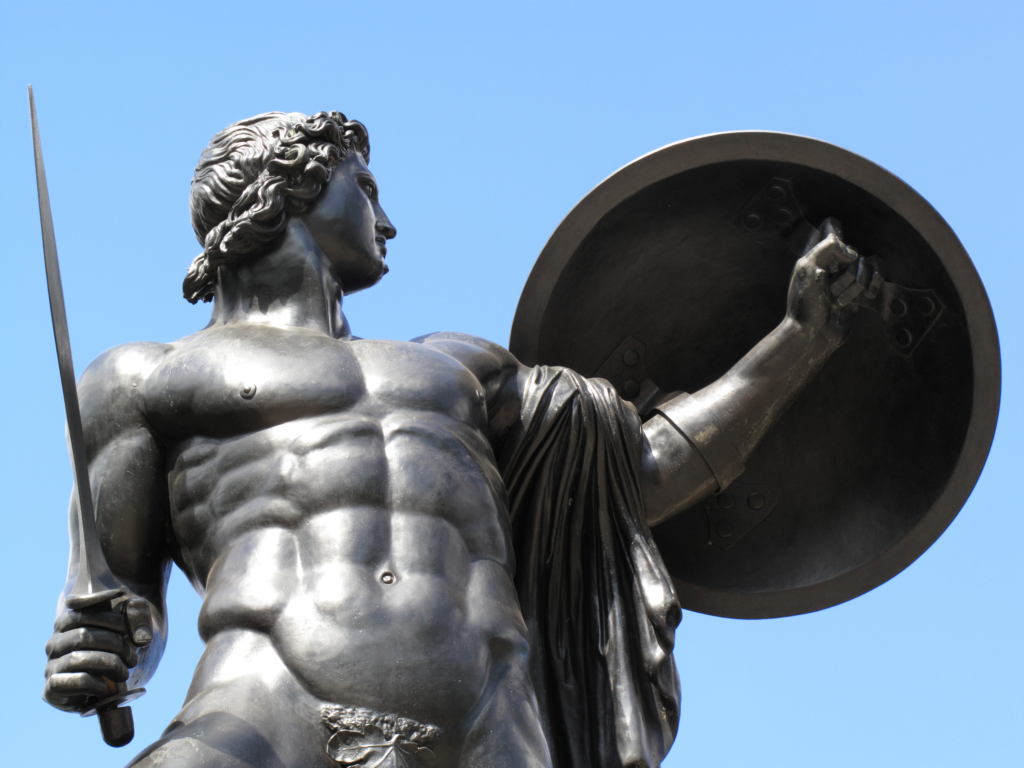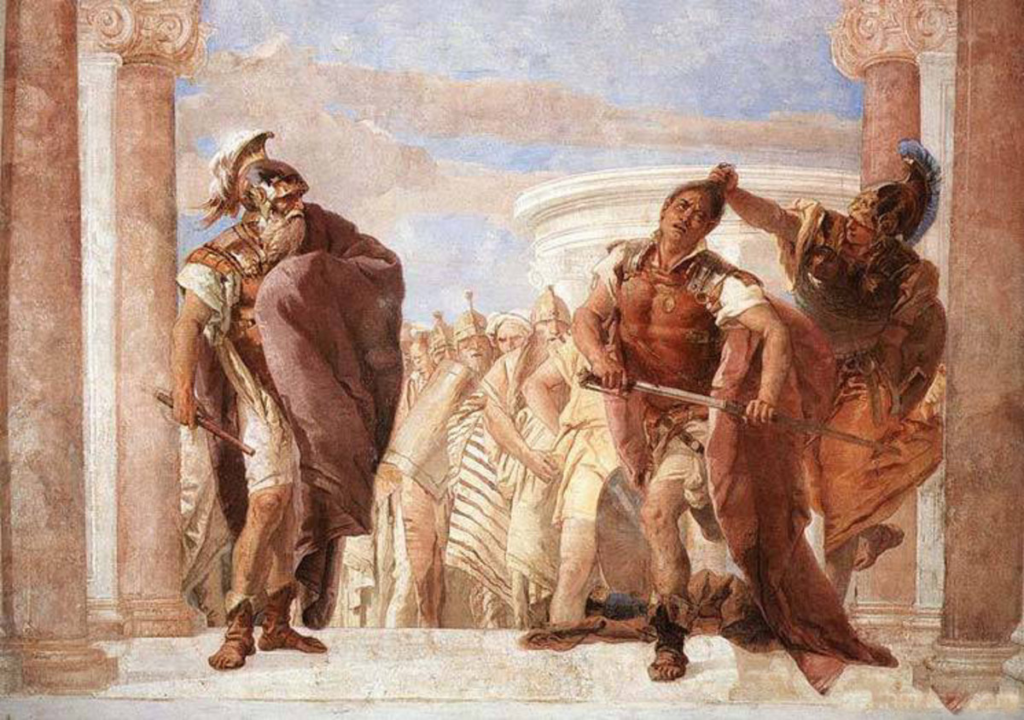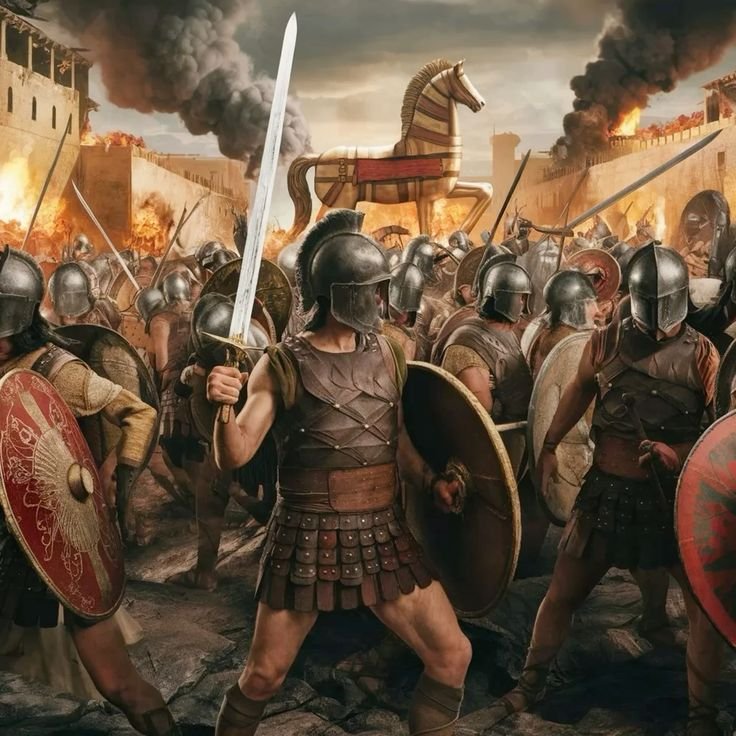The Iliad by Home
The Iliad by Homer is one of the oldest and most significant works of Western literature.
Time Period: Likely composed in the 8th century BC
Genre: Epic Poetry
Summary: The Iliad is an ancient Greek epic poem set during the Trojan War, the ten-year siege of the city of Troy by a coalition of Greek states. The poem mainly focuses on the Greek hero Achilles and his rage against King Agamemnon. It explores themes like the glory of war, the wrath of Achilles, the whims of the gods, and the fate of human beings.
Major Characters:
Achilles in The Iliad
Achilles: The greatest Greek warrior whose rage and withdrawal from battle affects the course of the war.
Role: The greatest Greek warrior and hero of the Trojan War.
Background
- Parentage: Achilles is the son of the mortal Peleus, king of the Myrmidons, and the sea nymph Thetis. His divine lineage grants him extraordinary strength and prowess in battle.
- Invulnerability: According to later myths, Thetis dipped Achilles in the River Styx, making him invulnerable except for his heel, which she held him by.
Character Traits
- Warrior Skills: Achilles is unmatched in combat, renowned for his speed, strength, and skill on the battlefield.
- Pride and Wrath: He is also known for his intense pride and powerful emotions, particularly his wrath, which drives much of the plot in The Iliad.
- Loyalty and Friendship: Achilles’ deep bond with his close companion, Patroclus, showcases his capacity for profound loyalty and love.
Key Events
- The Quarrel with Agamemnon: In Book 1, Achilles’ rage ignites when Agamemnon takes his war prize, Briseis, leading to Achilles’ withdrawal from battle. This decision has significant repercussions for the Greek forces.
- The Death of Patroclus: In Book 16, Patroclus, wearing Achilles’ armor, enters the battle and is killed by Hector. This event profoundly affects Achilles, filling him with grief and a desire for revenge.
- Return to Battle: Fueled by rage and sorrow over Patroclus’ death, Achilles returns to the battlefield with newfound ferocity.
- Duel with Hector: In Book 22, Achilles confronts and kills Hector in a dramatic and intense duel. He then dishonors Hector’s body by dragging it around the walls of Troy.
- The Ransom of Hector’s Body: In Book 24, King Priam bravely approaches Achilles to ransom Hector’s body. Moved by Priam’s plea and reminded of his own father, Achilles agrees to return Hector’s body, showing a moment of empathy and humanity.
Themes and Symbolism
- Wrath: The central theme of Achilles’ character, his anger drives the narrative and leads to both his greatest triumphs and deepest sorrows.
- Mortality and Heroism: Achilles grapples with his mortality and the desire for everlasting glory. He faces the tension between living a long, uneventful life or achieving a short, glorious one.
- Humanity: Despite his god-like prowess, Achilles displays deep human emotions, particularly in his relationship with Patroclus and his eventual empathy towards Priam.
Illustration Ideas
- Achilles grieving for Patroclus: An emotional scene capturing Achilles’ profound grief over the loss of his dear friend.
- Achilles in his new armor: A striking image of Achilles in the armor forged by Hephaestus, ready for battle.
- The duel between Achilles and Hector: A dramatic depiction of the intense and fateful combat between the two heroes.

Hector in The Iliad
Role: Trojan prince and the greatest warrior defending Troy.
Background
- Parentage: Hector is the son of King Priam and Queen Hecuba of Troy, making him a prince of the city.
- Family: He is married to Andromache and has a young son, Astyanax.
Character Traits
- Courage and Honor: Hector is depicted as a brave and honorable warrior, deeply committed to defending his city and family.
- Duty and Responsibility: He is driven by a strong sense of duty to protect Troy and its inhabitants, often putting the needs of others above his own.
- Compassionate Leader: Hector cares deeply for his family and his people, making him a beloved and respected leader.
Key Events
- Defender of Troy: Throughout the epic, Hector is shown leading the Trojan forces in battle, demonstrating his prowess and bravery.
- Farewell to Andromache: In Book 6, Hector’s poignant farewell to his wife Andromache and son Astyanax highlights his deep love and the personal sacrifices he makes for duty.
- Confrontation with Achilles: In Book 22, Hector faces Achilles in a fateful duel outside the walls of Troy. Despite knowing the odds are against him, Hector fights valiantly but is ultimately killed by Achilles.
- Aftermath: After his death, Hector’s body is dishonored by Achilles, but later, in a moment of humanity and empathy, Achilles returns the body to King Priam for a proper funeral.
Themes and Symbolism
- Heroism: Hector embodies the ideal warrior-hero, fighting selflessly for his city and loved ones.
- Fate: Hector’s tragic end underscores the theme of fate and the inevitability of death, even for the greatest heroes.
- Honor and Legacy: His actions and sacrifice leave a lasting legacy of honor and valor.
Illustration Ideas
- Hector bidding farewell to Andromache: A touching scene capturing the emotional farewell between Hector and his family.
- Hector in battle: An intense image of Hector leading the Trojan forces with courage and determination.
- The duel with Achilles: A dramatic depiction of the fateful confrontation between Hector and Achilles.

Agamemnon in The Iliad
Agamemnon is a key figure in The Iliad and plays a central role in the Greek campaign against Troy.
Role: King of Mycenae and leader of the Greek forces during the Trojan War.
Background
- Parentage: Agamemnon is the son of Atreus and the brother of Menelaus, the king of Sparta. His noble lineage places him in a position of significant authority among the Greek kings.
- Leadership: As the commander-in-chief of the Greek army, Agamemnon holds the highest authority among the Greek leaders assembled for the Trojan War.
Character Traits
- Pride and Ambition: Agamemnon is characterized by his pride and ambition, which often lead to conflicts with other leaders and warriors.
- Authority and Leadership: He is respected for his position and leadership, but his decisions and actions sometimes cause tension and dissent within the Greek camp.
- Stubbornness: Agamemnon’s stubborn nature and sense of entitlement can lead to reckless decisions and strained relationships.
Key Events
- The Quarrel with Achilles: In Book 1, Agamemnon’s demand for Achilles’ war prize, Briseis, sparks a bitter quarrel between the two, leading to Achilles’ withdrawal from battle. This conflict has significant consequences for the Greek forces.
- The Dream: In Book 2, Agamemnon is visited by a dream sent by Zeus, urging him to test the morale of the Greek army. He announces that they should give up and return home, but the suggestion is a ruse to gauge their resolve.
- The Embassy to Achilles: In Book 9, Agamemnon sends an embassy, including Odysseus, Ajax, and Phoenix, to offer Achilles gifts and apologize in an attempt to persuade him to return to battle. Achilles, however, refuses the offer.
- Leadership in Battle: Agamemnon is often seen leading the Greek forces into battle, demonstrating his prowess as a warrior and commander.
Themes and Symbolism
- Pride and Honor: Agamemnon’s actions are heavily influenced by his pride and desire for honor, often leading to conflicts with other characters.
- Authority and Power: His leadership and decisions reflect the complexities of authority and the challenges of maintaining unity and morale among the Greek forces.
- Tragic Flaws: Agamemnon’s character embodies the concept of tragic flaws, as his pride and stubbornness lead to significant strife and consequences for the Greek army.
Illustration Ideas
- Agamemnon and Achilles’ Quarrel: A dramatic scene depicting the heated argument between Agamemnon and Achilles, highlighting their conflicting pride.
- Agamemnon in Battle: An image of Agamemnon leading the Greek forces with determination and authority.
- The Embassy to Achilles: A scene showing Agamemnon’s emissaries offering gifts to Achilles, trying to mend the rift.

Odysseus in The Iliad
Odysseus is one of the most fascinating characters in The Iliad and Greek mythology in general. Known for his cleverness and resourcefulness, he plays a crucial role in the Trojan War.
- Role: King of Ithaca and one of the Greek leaders.
- Traits: Renowned for his cunning intelligence, strategic thinking, and persuasive speech.
Key Contributions
- Embassy to Achilles: In Book 9, Odysseus is part of the embassy sent to persuade Achilles to return to battle. He uses his eloquence and reasoning to try and convince Achilles.
- The Wooden Horse: While the Trojan Horse is more prominently featured in later works like The Aeneid, Odysseus is often credited with devising this ingenious strategy to infiltrate Troy, leading to its eventual fall.
- Diplomatic Skills: Throughout the epic, Odysseus is seen negotiating, advising, and employing his wit to navigate complex situations.
Notable Traits and Actions
- Cleverness: Odysseus is known for his quick thinking and ability to devise clever solutions to problems. His cunning nature earns him the nickname “the man of many wiles.”
- Bravery: Despite his preference for strategy over brute force, Odysseus is also a brave warrior who fights valiantly in the Trojan War.
- Loyalty: Odysseus is deeply loyal to his comrades and his home, and his actions are often driven by a desire to return to Ithaca and his family.
Post-Trojan War
- The Odyssey: Odysseus’ adventures continue in Homer’s other epic, The Odyssey, which details his ten-year journey home after the war. This epic further showcases his cleverness, resourcefulness, and determination as he encounters various challenges and mythical creatures.

Helen of Troy
Role: Her abduction by Paris, the Trojan prince, is the catalyst for the Trojan War.
Background
- Parentage: Helen is often described as the daughter of Zeus and Leda, making her semi-divine. She is also said to be the most beautiful woman in the world.
- Marriage: Helen was married to Menelaus, the king of Sparta. Their marriage united powerful Greek states.
The Abduction
- Paris’ Judgment: The story begins with the judgment of Paris, where the Trojan prince Paris is asked to choose the fairest goddess among Hera, Athena, and Aphrodite. He chooses Aphrodite, who promises him the most beautiful woman in the world—Helen.
- Elopement or Abduction: Paris travels to Sparta, and either elopes with or abducts Helen, depending on the version of the story. This act is seen as a great insult to Menelaus and a violation of the sacred guest-host relationship.
Consequences
- Trojan War: Menelaus’ outrage leads him to seek help from his brother Agamemnon and other Greek kings, resulting in the Greek expedition to Troy.
- Symbolism: Helen becomes a symbol of beauty and desire, as well as the cause of immense suffering and conflict.
Helen’s Role in The Iliad
- Trojan Side: While in Troy, Helen is often depicted as feeling remorseful and conflicted about her role in the war. She is treated with respect by Priam and other Trojans.
- Interactions: Helen has notable interactions with several characters, including Priam, Hector, and Paris, showcasing her complex emotions and the consequences of her actions.
- Regret and Isolation: Helen expresses regret for the destruction her presence has caused and shows a longing for her former life.

Priam’s Role in The Iliad
Priam: The aged king of Troy.
- King of Troy: Priam is the ruler of the city of Troy and father to many children, including Hector and Paris.
- Noble and Compassionate: He is depicted as a deeply compassionate and noble figure, showing immense love and concern for his sons and his city.
- Tragic Figure: Priam faces great personal loss and suffering due to the war, especially with the deaths of many of his children, including Hector.
- Courage and Humanity: One of the most poignant scenes in The Iliad is when Priam bravely approaches Achilles to ransom Hector’s body. Despite his age and the danger, he shows immense courage and humility, appealing to Achilles’ sense of compassion and shared humanity.
Memorable Moments
- Ransom of Hector’s Body: In Book 24, Priam’s journey to Achilles’ tent to plead for the return of Hector’s body is a powerful moment of human connection and empathy. He reminds Achilles of his own father, Peleus, and their shared grief leads to a moment of reconciliation.
- Depiction of Sorrow: Priam’s sorrow and lamentation over Hector’s death highlight the devastating personal toll of war and the deep love he has for his children.



I am extremely impressed with your writing skills as neatly as with the format to your blog. Is this a paid topic or did you customize it your self? Anyway stay up the nice high quality writing, it is uncommon to peer a great blog like this one today!